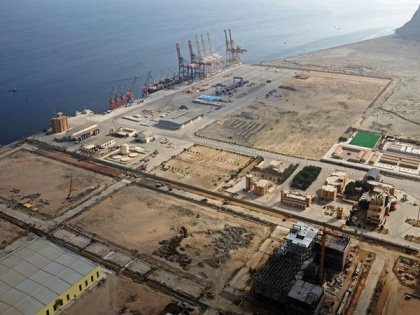US, Japan, Australia reviving 'Blue Dot' to provide alternative to China's BRI
By ANI | Published: June 9, 2021 10:01 PM2021-06-09T22:01:50+5:302021-06-09T22:10:07+5:30
US President Joe Biden's administration, along with the Japanese and Australian governments, are reviving the 'Blue Dot Network' infrastructure initiative to provide an alternative to China's Belt and Road Initiative (BRI).

US, Japan, Australia reviving 'Blue Dot' to provide alternative to China's BRI
US President Joe Biden's administration, along with the Japanese and Australian governments, are reviving the 'Blue Dot Network' infrastructure initiative to provide an alternative to China's Belt and Road Initiative (BRI).
The Blue Dot Network was first announced during former President Donald Trump's administration, and kicked off talks among stakeholders in Paris on Monday after a prolonged period of inactivity, reported Nikkei Asia.
The initiative, which would certify projects meeting such standards as transparency and sustainability, is meant to galvanise the private sector to invest in infrastructure development in emerging markets.
"The Blue Dot Network will be a globally recognized symbol of market-driven, transparent and sustainable infrastructure projects," the Blue Dot Network said on Monday.
According to the Organisation for Economic Co-operation and Development (OECD), over 150 global executives, covering 96 countries that are responsible for some USD 12 trillion of assets under management.
Matthew Goodman and Daniel Runde, two experts at the Washington-based Centre for International and Strategic Studies, argued that the US has unique strengths, including trillions of dollars of pension and insurance funds looking for the long-term returns that infrastructure investment can bring, reported Nikkei Asia.
In a 2020 commentary, they argued that the Blue Dot Network could "provide a high-standard certification to give investors confidence and move one step closer to infrastructure becoming an asset class".
Wilbur Ross, the US commerce secretary at the time, called the initiative "a multilateral approach to fostering sustainable economic growth by promoting excellence in infrastructure development and supporting alternatives to predatory lending".
Getting a 'blue dot' would be like getting a Michelin-star rating for a restaurant, said Matthew Pottinger, Trump's deputy national security adviser. "As that catches on, private sector players are going to want to get in and participate in those projects... So this is designed to also crowd out some of the more corrupt approaches to infrastructure investment that really threaten to undermine prosperity for all of us," he said at the Raisina Dialogue in India last year.
According to Nikkei Asia, the US has been eager to get India on board for the project, as the latter remains the only member of the Quadrilateral Security Dialogue (Quad) to not be a part of the Blue Dot Network.
The latest US initiative will use infrastructure development principles set by the G20 and G7 nations as a foundation for its standards, while OECD will provide technical and operational input to the global certification process.
The creation of such a set of standards will have to involve stakeholders ranging from builders to financiers and will require intensive discussions and negotiations, said Goodman and Runde in a commentary last year.
Meanwhile, China has sought to step up cooperation with Central Asian countries on security issues amid fears of a resurgence of terrorism in Afghanistan and subsequent threat to its BRI infrastructure projects in the region.
The project has been greatly affected by the COVID-19 pandemic, with Beijing quietly scaling back the project, particularly in the emerging markets of Africa, due to banks being over-extended and loans not being repaid on time.
( With inputs from ANI )
Disclaimer: This post has been auto-published from an agency feed without any modifications to the text and has not been reviewed by an editor
Open in app